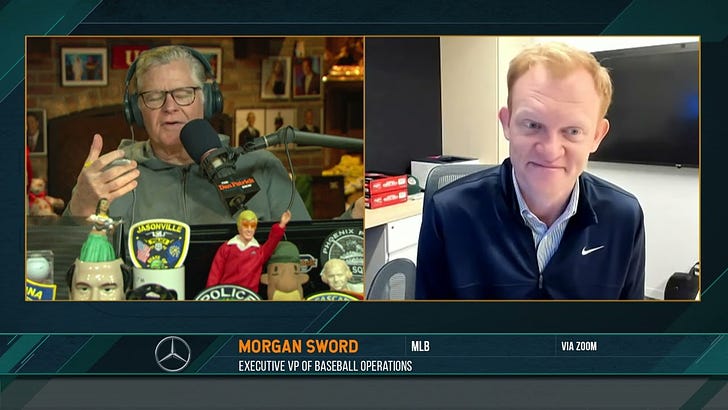I can’t overestimate what a big deal it was getting the minor league CBA done. It had been quiet to the point of worrisome, but the historic deal got done just in time for Opening Day. Which made Opening Day the celebration of the new rules. I don’t love promoting a rule set over the great stars of the game, but Rob Manfred made the rounds, including a stop in Arlington, to bask in the glow. In an interview with both broadcasts, Manfred talked more about pitch clocks than he did about Arlington getting next year’s All Star Game. Priorities.
However, Manfred wasn’t the driving force on the rule changes. Yes, he’s the face of the league and yes, he pushed for it in negotiations for last year’s CBA, but there’s two people who have been front and center up to this point. First, Theo Epstein focused on testing various rules at the minor league level and vetting the changes. Once those were set, Morgan Sword, the league’s head of baseball operations, stepped in and has been the lead on explanations to the point of making videos for the press.
Note that Rob Manfred’s contract is done in 2024. That’s in the midst of the current CBA, but enough time ahead of it for a replacement to get up to speed, especially if they’re already around the game. You know, like Epstein and Sword are. Sword’s position is new and Manfred rose from the Labor side (where Dan Halem is the current lead.) Epstein is a much more publicly known one, but would the owners flip over to someone who’s been much more on the team side? We’ll see, especially if Manfred doesn’t get his wanted extension this year. Going into that final year as a lame duck would be terrible for all concerned.
That makes the rules, and credit for them, one of the more interesting campaign tools. If Manfred makes it work, and can guide the league through the RSN mess, he’s very likely to get extended. (See Goodell, Roger.) The default option will be the devil they know, if the TV money is flowing and the franchise values are raising. Will we have new ownership in Washington, less problems in Baltimore, and stadium situations in four cities (Oakland, Las Vegas, Tampa, and St. Pete)? Those could make Manfred seem less in control. Could he open the floodgates with the easy money of expansion dollars? Manfred won’t get the nine figures that Roger Goodell will, but he’s certainly going to be comfortable. My expectation is he’ll get a short extension - two or three years - and that will be an indication of where the owners want to go in terms of all these issues without committing to Manfred leading the next CBA.
Another note on the minor league CBA is that as it makes players salaried employees, they shouldn’t be subject to overtime rules and therefore, it might knock out some of the outsourcing that was going to be necessary if the players were hourly. I don’t have all the details yet, nor am I a labor lawyer, so we’ll have to see how this one plays out.
I do write about injuries, so let’s get to those:
ROBBIE RAY, SP SEA (strained forearm)
More than one person asked me this weekend “how often do forearm flexor strains lead to elbow issues?” First, let’s understand that here in 2023, we have theories about how the elbow holds up under the stress of pitching. We know a lot of things, but not unlike other areas of physics, we don’t have enough experiments to really know. Einstein told us that if you break apart atoms, energy would happen, but we didn’t really know until Oppenheimer. (Yes, excited for that movie.) We think we know how the UCL doesn’t break, how it’s assisted by other structures, but we simply don’t know.
We also don’t have clear data, ranging back more than a few years, on how to answer that question. It seems like a lot, but it also implies that the medical staff mishandles things. I don’t think that’s the case, but if you told me that a pitcher that was stressing the flexor that much was also overloading the UCL, I would nod my head and think yes, he was at more risk. Risk is everything in my world.
For Robbie Ray and the Mariners - a top notch medical staff - they’re far more concerned with the practical of a low-grade flexor strain than they are the theory. (BTW, strain with a T. The flexor is a muscle.) It’s a low grade strain, but the M’s will want to have that fully healed before letting their ace back out there, so that he doesn’t become another data point. Low grade strain or not, this is one that will take more than the minimum and that the team is likely to be very cautious with.
The M’s will sub in Chris Flexen while Ray is out, but with a deep and young pitching staff, this is both blessing and curse. Are the Mariners at increased risk for this due to the way they program the throwing routines, or how they set up their programs? With Driveline right there, you’d think they’d have the best and brightest, but there’s been rumblings that there’s a number of cooks in the kitchen. Too many? I don’t know but rumblings are louder than whispers. In the case of Robbie Ray, the hope is low grade means close to the minimum and heals up well enough that we’re not talking about surgeons in the near future.




